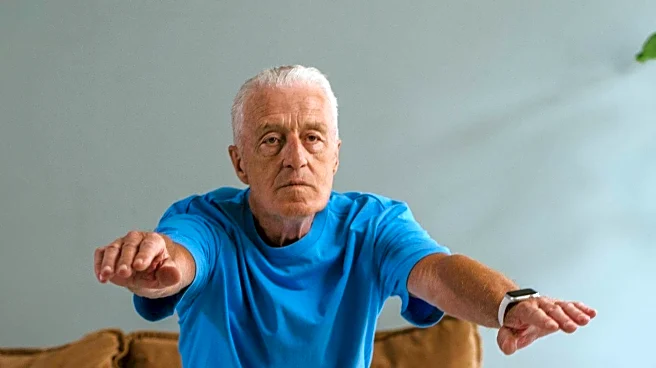What's Happening?
Josh York, founder and CEO of GYMGUYZ, emphasizes the effectiveness of short, high-intensity workouts for individuals over 50. These workouts, lasting only eight minutes, can promote muscle gains, boost mobility, and improve metabolism. York suggests
engaging multiple muscle groups simultaneously, maintaining an elevated heart rate, and incorporating strength, mobility, and balance exercises. Morning workouts are particularly beneficial, as they jumpstart metabolism, regulate hormones, and improve energy levels, mental clarity, and circulation. York's routine includes exercises like bodyweight squats, pushups to shoulder taps, and standing calf raises, all designed to reverse aging effects more efficiently than longer gym sessions.
Why It's Important?
The approach advocated by York is significant as it challenges the traditional notion that longer workouts are necessary for effective fitness, especially for seniors. By focusing on short, intense routines, older adults can achieve similar or better results in terms of muscle preservation, energy levels, and overall strength. This method is particularly beneficial for seniors who may have limited time or physical capacity for extended exercise sessions. The emphasis on morning workouts also aligns with studies linking early-day physical activity to improved longevity and sleep patterns, offering a practical solution for aging populations seeking to maintain health and vitality.
What's Next?
As more seniors adopt this approach, fitness programs and trainers may increasingly focus on developing short, high-intensity routines tailored to older adults. This could lead to a shift in the fitness industry, prioritizing efficiency and accessibility in exercise regimens. Additionally, further research may explore the long-term benefits of such routines, potentially influencing public health recommendations for senior fitness. Fitness centers and personal trainers might also adapt their offerings to include more morning classes and sessions designed to cater to the specific needs of older adults.
Beyond the Headlines
The trend towards shorter workouts for seniors may also have cultural implications, as it challenges societal perceptions of aging and physical capability. By demonstrating that effective fitness can be achieved without lengthy sessions, it empowers older adults to take control of their health and defy age-related stereotypes. This shift could foster a more inclusive fitness culture, encouraging participation from those who may have previously felt excluded due to time constraints or physical limitations.
















